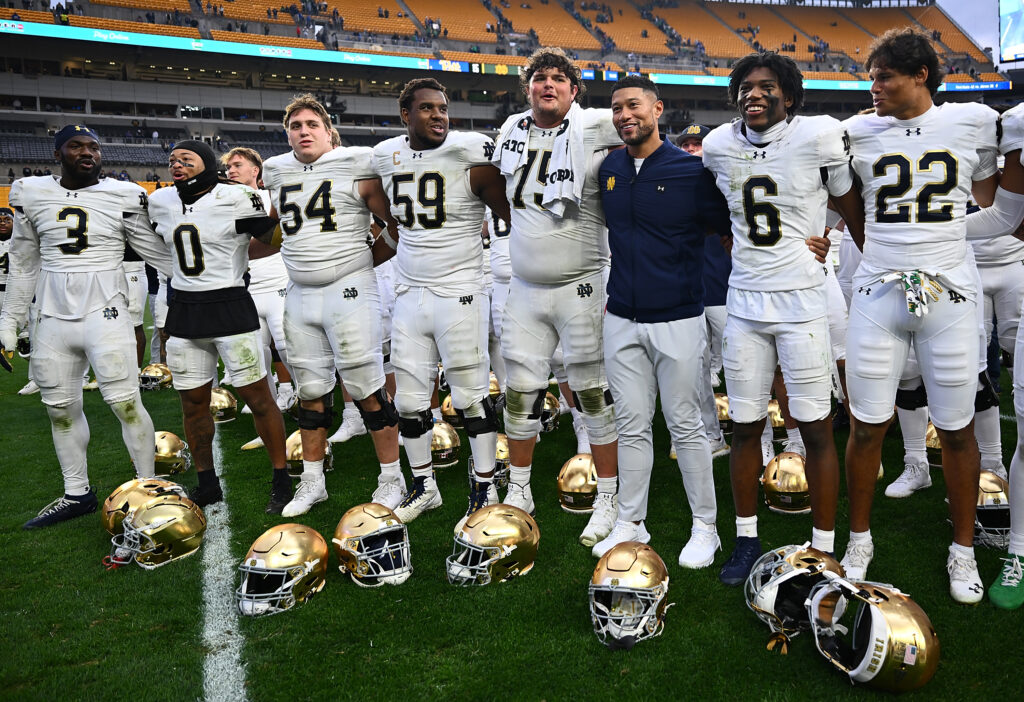The debate seems as though it should be simple. Two teams with the same record are in the running for a playoff berth, and one beat the other. Case closed. But the debate over Miami and Notre Dame has proved to be much more complicated.
In the weeks since Miami’s season-opening win over Notre Dame, the Fighting Irish have proved — in the eyes of computer models and seemingly in the eyes of the College Football Playoff selection committee — to be the better team. Both schools are in the mix for an at-large playoff berth; it is unlikely that both will be chosen. (Miami has a long-shot chance to reach the ACC title game for an opportunity at an automatic berth, but it would require a win over Pittsburgh on Saturday and upsets elsewhere.) The situation has ignited a debate over the importance of a head-to-head victory in the context of a complete résumé, with fans of both teams certain their side is correct.
The debate over Miami and Notre Dame isn’t simply another playoff argument, however. It’s a test of what the selection process values. Does the full season matter more than one meeting? What happens when different parts of a résumé point in different directions?
What the computers say
The computer ratings that the committee is said to rely on draw a sharp distinction between the teams. Notre Dame shows up as a top-10 team in nearly every widely used system. Miami generally falls in the 10-to-20 range.
These models evaluate how well a team performs down to down and week to week and therefore are consistent tools for measuring overall team quality. When that many different systems point in the same direction, the committee has a clearer picture of who has played at a higher level over the full season.
Notre Dame’s performances also have been steadier than Miami’s, with fewer weeks where its level of play dipped. The Fighting Irish rank ahead of the Hurricanes in ESPN’s game control metric, and Miami’s season has included more narrow wins over weaker opponents.
What the résumés say
The résumé side of the comparison is just as lopsided. Notre Dame played the tougher schedule and came out with more wins over teams that actually finished with winning records or were rated in the national top 40. Its losses came to opponents who sit near the top of the rankings (Miami and No. 3 Texas A&M). Miami can point to the head-to-head win, but its losses came to teams outside the national elite (Louisville and SMU), and it has fewer victories over opponents with strong résumés of their own.
That kind of context matters when the committee compares teams with identical records. According to the résumé component of ESPN’s College Football Power Index, Notre Dame has played the tougher schedule, performed better against it and looked stronger overall. Brian Fremeau’s FEI, which measures how efficient teams are on a per-possession basis after adjusting for opponent strength, rates Notre Dame higher than Miami (fourth vs. 11th), and the schedule metrics also favor Notre Dame (34th vs. 53rd).
I’m pretty sure the CFP doesn’t specifically use FEI data in its deliberations, but I’ve tracked the correlation of CFP rankings with my strength of record ratings since 2014. The correlations are stronger this year than they have been previously: https://t.co/87V8ZdHQGH pic.twitter.com/qcVK0WJMwy
— Brian Fremeau (@bcfremeau) November 20, 2025
How much should head-to-head matter?
Miami’s strongest argument is straightforward: It beat Notre Dame. That matters, and the committee has always said a head-to-head result should be part of any comparison. But it also came in Week 1. Early games count the same as any other, but they’re not always the best indication of how a team will perform over the long haul.
The problem for Miami is that no CFP committee has ever treated an early-season head-to-head result as the deciding factor when the broader résumé clearly points the other way. In 2014, it ranked TCU ahead of Baylor for six straight weeks despite Baylor’s head-to-head win, citing TCU’s stronger overall profile. In 2016, it selected Ohio State for the playoff over a Penn State team that beat the Buckeyes, with the committee chair calling Ohio State’s résumé the nation’s best. And in 2019, it placed Oregon ahead of Auburnfor most of the season even though the Tigers won their Week 1 matchup, arguing that the Ducks’ full season carried more weight than a single early result.
The matchup between Notre Dame and Miami is the most significant philosophical test the system has faced in the 12-team playoff era. In choosing between a head-to-head win and a stronger full-season résumé, the committee will signal what it really values: a standout individual result or a sustained body of work. It will be a statement about how “deserving” is defined.
Miami won the game, but Notre Dame won every argument the committee claims to care about.
The post Miami beat Notre Dame, but the Irish are a more deserving playoff team appeared first on Washington Post.




